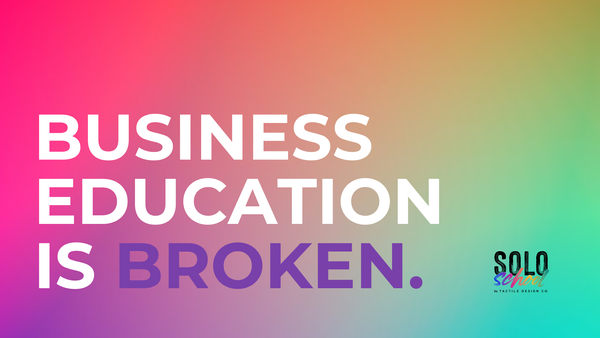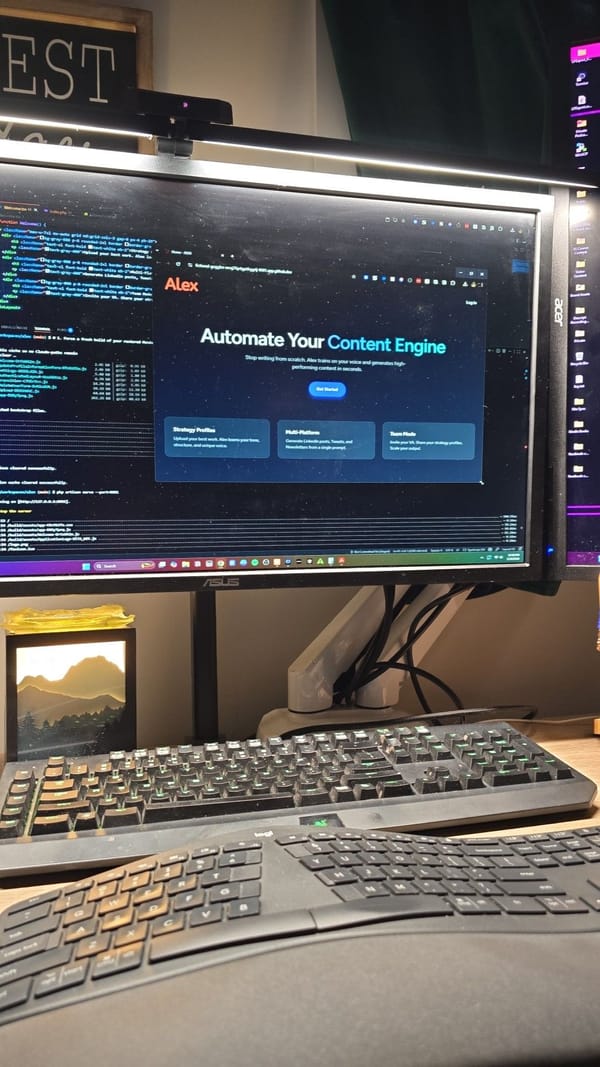Business education is failing entrepreneurs at an alarming rate.
Less than 11% of micro-enterprise businesses in the US ever exceed $100k in revenue.
(We’re defining a micro-enterprise as a non-employer business. A non-employer business is a business that generates over $1k per year in revenue, is subject to federal income tax, and does not have permanent employees. 75% of all businesses in the United States are non-employer businesses.)
However. The “success rate” for business education programs is set at around 5%. If 5% of your students see success, you’re achieving or exceeding industry standards.
So if 11% of all micro-enterprises reach $100k per year or more in revenue, but only 5% ever see that success within the very programs meant to help them achieve success…
Isn’t that a problem?
Shouldn’t our education in this space aim to increase success rates beyond the baseline?
Whether it is a program through SCORE/SBA, a university, or an online program run by an entrepreneur, success rates stay pretty steadily under 5%.
Why are we failing entrepreneurs so badly?
Because we’re not teaching them the right things.
In fact, almost nobody is actually teaching the right things, because the right things are a tough sell!
It is really, really hard to teach business skills properly. It’s a complex set of skills, abilities, and intuition that must be developed over time and with practice. It is very, very hard to do “on purpose”, so we default to what we know:
Teaching new knowledge and tactics so people feel like they got value.
Why? Because people who join a program and get pushed to do things that are really difficult, instead of being given a template to post on LinkedIn, tend to ask for more refunds. That’s it. That’s the whole problem.
Running a business isn’t a set of skills like “posting to Facebook” and “editing videos” and “developing pricing” - running a business is a set of pattern spotting and problem solving skills that need to be nurtured and developed over time.
Intuitively, we know this.
Walking is not “lifting your foot” and “putting your foot down” and “bending your knees”. You can do all those things without ever moving an inch, though they’re all required to actually walk.
Learning to walk is a complex process that takes humans months-to-years of practice, repetition, modeling, and support in order to get right.
But we live in a world where a course on learning to walk in 20 minutes or less would sell far better, so we get the business equivalent of online courses teaching us how to lift our foot and bend at the knees without ever learning how to lean forward, just right, and catch your fall.
Learning to be an entrepreneur is even more complex than that.
These skills cannot be taught in a 10-minute online video with a worksheet. They must be taught through practice, review, revision, frustration, invention, creativity, and necessity.
And because frustrated customers don’t give glowing testimonials, what do we do instead?
We give them the 10-minute video so they have the info, and tell them it is up to them what they do with it.
Without ever helping them understand when to use it, why, or what to do if it goes wrong other than come back to us and buy something else.
How we can learn from tech education
Tech education is a LOT like business education. In order to get quick wins and help students feel like they're progressing quickly, they teach them how to code.
Sounds like the whole goal of programming, right? Like, duh, of course you need to know how to code, that's what a programmer does. And if you think that, you're not alone in your assumption. In fact, the entire industrial complex built around online education and coding bootcamps for programmers is built on this fundamental premise - that programmers code, so if you can learn how to write code, you'll know how to be a programmer.
So, let's go over a few examples of what a programmer might have to do on a day to day basis then:
- Do I put this CSS inline, so it lives on this page and I have to recreate it anywhere else on the site it needs to live but it's more efficient everywhere else, or do I have to add it to the stylesheet and call it here to make the stylesheet larger but make each individual instance of it more consistent and faster?
- Oh, this code isn't working. Where do I start debugging? Is the site/app actually loading? How far is it getting? What are the things I've added since the last successful load of the site/app that could have contributed to this?
- Will this error break things in a way that should stop the running of the code? Or is it less consequential and should be provided in the logs to be dealt with later?
- HOLY CANADIAN GOALIE BATMAN I have no idea why this function works, but the comment above it says that no one else knows either but it just does so I should leave it alone. Do I leave it alone? or do I back up this file and waste 6 months trying to avoid putting it back (just to put it back)?
- Do I update this plugin/docker image/whatever because there's a new version? Or do I leave things as they are and do a total overhaul in a few months when the new core is released?
These are all very real day to day decisions of even a junior developer or a freelance site admin. None of them are problems that can be solved by knowing how to type “Hello world.” and have a JavaScript file print it out for you on a homepage.
So, what do good programming schools teach?
Problem solving.
They teach programmers how to solve problems, how to spot patterns, how to ask the right questions in Google and GitHub and Stack Overflow and Reddit, so they actually get the answers they need.
AI tools cannot replicate this yet, either. I'll give you an example.
I have stopped Gemini AI from rebooting a crucial service running behind my website no less than 12 times. Why? Because it was about to reboot it before testing the new configuration, thereby potentially crashing the site. Good programmers know to test syntax and configuration before rebooting things like nginx. AI does not always remember this.
THIS is how we need to teach business.
Not “7 steps to running a Facebook ad" although those practical hands-on things are helpful in specific cases.
How to think like a business owner. How to problem-solve like a business owner. How to spot patterns and make changes. How to stop things from breaking. How to fix them when they break.
I've come a long way into doing this, but there's still a crucial gap - student expectations.
In order to learn how to solve problems and think like a business owner, you have to do hands-on projects with some training wheels and resources. You're going to have to fail. You're going to have to do things badly and still come back and ask for help.
Building a business isn't something you can buy in a box, it's a lifelong set of skills that take years to develop and will ALWAYS be improving.
That's why Solo School is leaning even harder into project-based learning.
Students in Solo School will now have the chance to take the problem solving skills they need to know, and actually PLAY with them, in fake scenarios. In sandbox situations. With guardrails and supports. To help them test and fail and test again. To develop the mindset that we're building a set of skills that cannot be taught, only supported and experienced, and that every time you persist past another failure, you're getting closer to knowing what the f*ck you're actually doing finally.
This is what good programming education does, that bad programming education does not. And it's what good business education does, that other business education does not.
So. IF you want to get your hands on this education for yourself, and actually develop the lifelong skills and attributes of a business owner instead of just taking another course you put on your shelf and learn how to copy/paste another Facebook post template, use the link below to apply for a spot in Solo School.
We'll answer your questions, help assess where you are in your business journey, and direct you to the right resources for your age and stage of growth. All free, no strings, but of course we do invite you to join Solo School if we think you're a fit.
If you're an educator in this space, drop a comment and tell the community what you're going to do to change your curriculum and start developing the skills of a business owner in your students.
How are you going to support their problem solving and experimentation?
How are you going to emphasize persistence?
How are you going to teach that slowing down and learning the foundations actually makes everything go faster?
Share your stuff and let us see it!
- Cheryl
Ways to Get Support
Ready to join Solo School? Click here to read more about how we can help you think like an entrepreneur, in the world’s first and only business school designed exclusively for neurodivergent adults.
Business Adaptation of the Week
Structure! Goodness. That whole thing about the ‘tism creeping in when your ADHD is medicated? Well it hadn’t really happened to me. That is, it hadn’t happened until I quit drinking Coke Zero, lost my all-day-long caffeine habit, and suddenly could see the actual impact of my medication without the extra jolt throughout the day.
Hooooooo boy.
Structure and routine have always been something my ADHD brain is allergic to, but right now I’m leaning on it heavily. It’s helping me get through these dysregulated days.
Of course, I’m doing it with my own flavour. No schedule! Rituals and routines. Approximate times for big things, like exercise, so I don’t forget to do them by letting my day take over with other things. But mostly just following the vibes and taking the same steps each day, as much as possible. It’s providing a nice, stable background to the massive ridiculousness that is the world at this point.
My Favourite Things This Week
Grocery shopping. Yes, I know that sounds absolutely wild, but hear me out.
I’ve been noticing that the things I used to find novel and helpful pre-2020, like ordering food online for delivery and not having to go out as much, are no longer as helpful as they once were. In fact, at one point in January/February, I didn’t leave my house for FOUR. FULL. WEEKS. That’s not healthy, that’s isolation.
Nevermind that things getting so convenient and frictionless was actually negatively impacting my relationship with the world and my mental health.
So, I go out once a week now and actually physically get my groceries.
I go to the farm stand to get some local stuff, then the produce market and bakery, hop over to the other farm stand for eggs, visit the local butcher for meat, and then stop by the zero-waste store for some pantry staples and cleaning supplies. If I have time and I’ve been good with my budget, I stop for lunch at my local bistro and then walk through the bookstore next to it to browse for a good read before going into the big-box store for anything on my list I couldn’t get elsewhere.
Does it take me like three hours to do this? Yes.
Is it slightly more expensive? Sometimes, depending on whether I impulse buy cool shit or not 😂😂.
Is it supporting local businesses in ways I haven’t done in years? Absolutely.
Does it actually feel better once I’m out the door, to go physically choose my bread, my tomatoes, my meat, to use all of my senses, to treat myself to a light lunch and a book?
Hell. Yes.
Yesterday, I went on my weekly grocery shopping run and spent the first two hours browsing the shops in my local downtown. I found a really cool witchy store where I bought a fountain pen and a teacup, picked up the BEST smelling set of bubble bath salts I’ve ever had, browsed the upmarket consignment shop, checked out the nerdy video game store, and sipped on a locally roasted cortado while enjoying a lavender earl grey tea sugar cookie. I was in absolute heaven.
Designers have something called “intentional friction”. They use it to make something more inconvenient on purpose, either to slow someone down to make them pay attention, or to get them to engage/enjoy something more.
This is my goal right now. Adding “intentional friction” to romanticize the hell out of my life, and it’s working so, so well. I’m loving it.
What I’m Reading
About to finish The Paris Bookseller tonight, and following it up with a library book called “Trail of the Lost: The Missing Hikers of the PCT”. Hiking the PCT is officially on my bucket list (maybe in 4-5 years or so…), and mysteries like these are always so entertaining, so it’s my next “fun read” - even though it’s not really fiction.
Make sure you’re following me on StoryGraph to see what I’m reading + get book recommendations from me!




